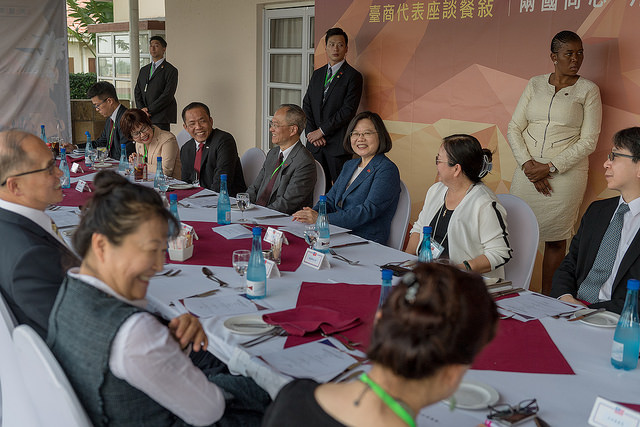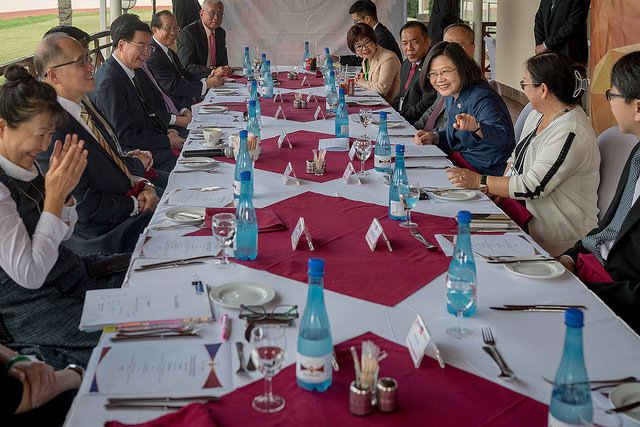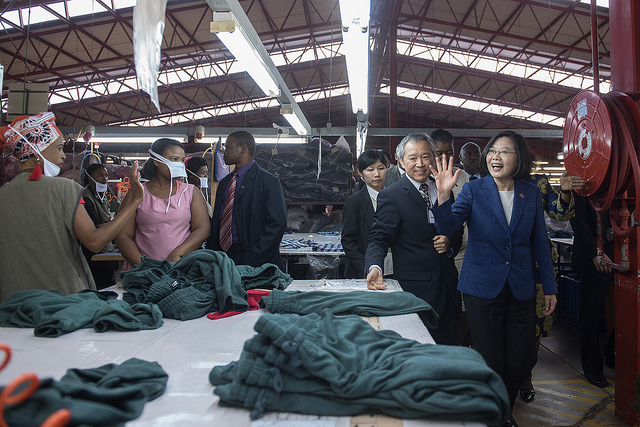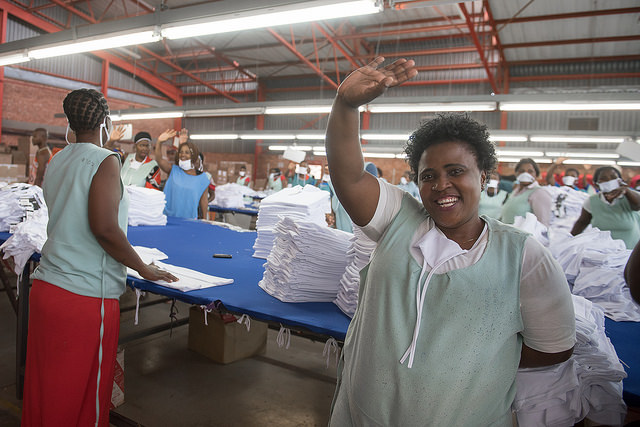News & activities
 News releases
News releases
President Tsai Ing-wen attended a luncheon meeting on April 18 around noon (6:00 p.m. Taipei time) with representatives of Taiwanese businesses in southern Africa.
In remarks, the president said it was a rare opportunity to meet with Taiwanese businesspeople operating in Africa. Everyone is working hard not only for their own companies, she said, but also on behalf of Taiwan. She then thanked them for helping Taiwan make an impact in Africa, making Taiwanese proud.
Noting that several heads of government agencies were present, President Tsai said the meeting had been arranged for two reasons. The first was to understand the difficulties of investors in Africa, and how the government can resolve those difficulties. She said she was aware of the problems that were reported, and that in just a little while, the ministers or deputy ministers of the ministries concerned would discuss those problems with the attendees.
Pointing to the recent trade standoff between the US and mainland China, the president noted that the global economic and trade environment is in a constant state of flux. Taiwan's government, she said, has responded by promoting diversification of Taiwan's trade and manufacturing bases.
President Tsai pointed out that through two-way industrial investment and cooperation, industries can strengthen their own competitiveness while Taiwan builds closer relationships with countries around the world. The government, she said, encourages Taiwanese enterprises to expand their global presence, and they should definitely not overlook Africa.
The president noted that there's much room for improvement in Africa's infrastructure and a growing demand for everyday household goods. Taiwanese enterprises excel in those areas and should make an effort to develop this kind of market because it has enormous growth potential. As an example, she cited the Taiwan External Trade Development Council (TAITRA) arranged for a trade mission to meet with buyers in North and West Africa about a month ago, an approach worth encouraging.
Noting that many of the attendees had experience investing in various areas of Africa, the president welcomed them to exchange views. She said, "Taiwanese enterprises should definitely come to Africa more often to investigate possibilities." President Tsai added that Taiwan will enhance the capabilities of official and non-official overseas units, and continue to support Taiwanese businesspeople as they develop African markets.
Although Taiwan doesn't have official diplomatic relations with very many countries in Africa, said the president, much can be achieved through non-government organizations. This year, for example, TAITRA opened new business centers in Algiers in Algeria, Lagos in Nigeria, and Johannesburg in South Africa, and she encouraged everyone to use them often.
President Tsai next pointed out that the second reason of the meeting was to update everyone on Taiwan's domestic economic development and talk about new investment opportunities there. The government's hard work over the last two years has produced some initial achievements. Taiwan's economy is gradually rebounding from its previous doldrums and stagnation, and the economic growth rate has exceeded expectations for two consecutive years. Total exports last year were the second highest in history, and the unemployment rate is at the lowest level in 17 years.
The president stated that the government's "5+2 industrial innovation program" has created opportunities for industry upgrading and transformation. The Forward-Looking Infrastructure Development Program will also pick up speed this year, spurring stronger domestic demand. The government has set up a one-stop contact window to solve problems for overseas Taiwanese businesspeople who want to come back and invest in Taiwan.
Finally, President Tsai said that the government enthusiastically welcomes Taiwanese businesspeople to return to Taiwan to set up research and development or production centers. People can use Taiwan's market and talent pool as springboards in their plans for global expansion, she said.
Among those present at the luncheon meeting were Overseas Community Affairs Council (OCAC) Commissioner Wan-Feng Yu (游萬豐) in South Africa and representatives from Taiwanese business community of southern Africa, as well as National Security Council Secretary-General David T. Lee (李大維), Minister of Foreign Affairs Joseph Wu (吳釗燮), OCAC Minister Wu Hsin-hsing (吳新興), National Security Council Deputy Secretary-General Tsai Ming-yen (蔡明彥), and ROC Ambassador to Swaziland Thomas J.C. Chen (陳經銓).
In the afternoon, the president visited the Taiwanese firm Tex-Ray Industrial Co. She first heard a briefing from Tex-Ray President Ricky Tai (戴鶴亮), who introduced the company and described its ready-to-wear clothing business. The Tex-Ray president then accompanied President Tsai on a factory tour so she could learn about their tailoring and machine sewing operations.
Others taking part in the Tex-Ray visit were Swaziland's Minister of Public Works and Transport Lindiwe Dlamini, and Minister of Commerce, Industry and Trade Jabulani Mabuza, as well as, from the Taiwan side, National Security Council Secretary-General David T. Lee, Minister of Foreign Affairs Joseph Wu, National Security Council Deputy Secretary-General Tsai Ming-yen, and ROC Ambassador to Swaziland Thomas J.C. Chen.












